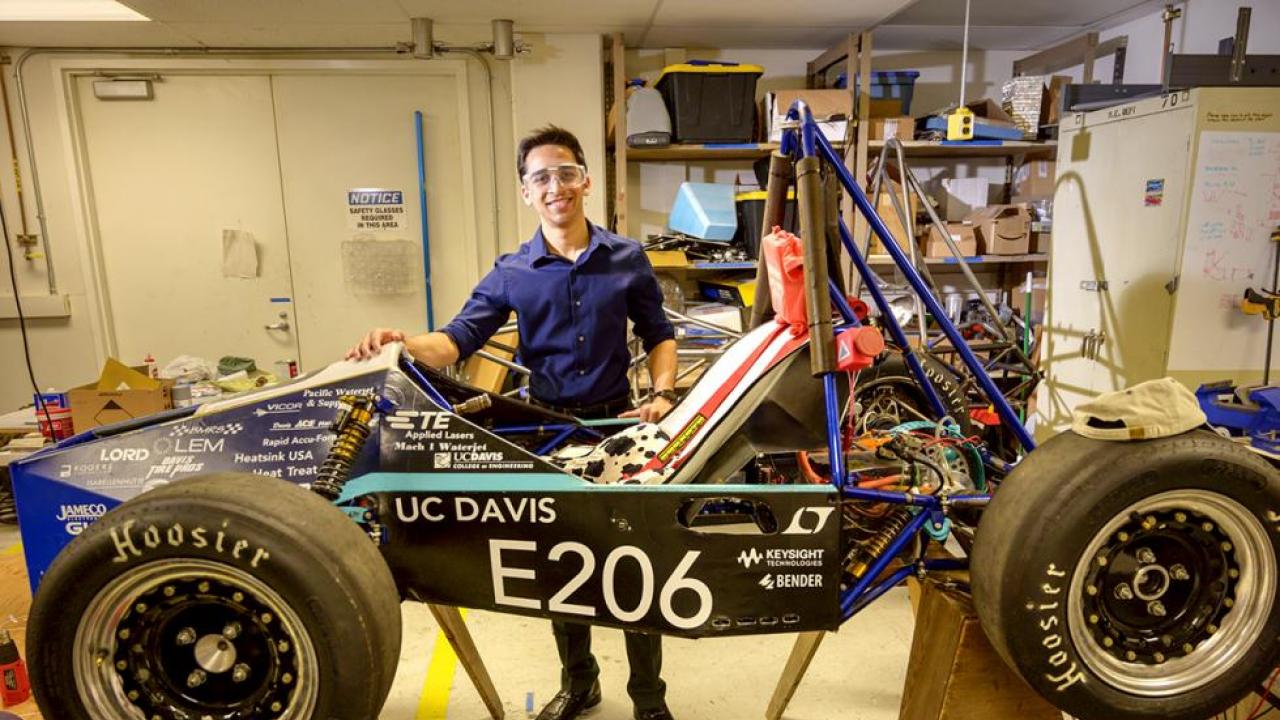
Student Spotlight: Shail Trivedi
Originally posted on the UC Davis Institute for Innovation and Entrepreneurship website.
Making electric vehicles, autonomous fleets ubiquitous
Shail Trivedi is a third-year mechanical engineering student who hopes to work with mechatronics/robotic systems or mechanical design of devices. “I love to learn,” he says, “and I find myself curious to learn more about the types of roles mechanical engineers play in today’s world and where I can best find my fit.”
Outside his studies, Trivedi enjoys reading, traveling, cooking and spending time with family/friends. He is a part of the Entrepreneur Quest: Undergraduate Internship Program (EQUIP) at the UC Davis Graduate School of Management.
Describe your project or venture.
I will be an intern at Tesla this summer on the interiors engineering team. My work will focus on supporting the team with their design of the cabin for the Model S and Model X electric vehicles.
I am part of the Formula Racing Team at UC Davis (FRUCD), a student-led team that meets weekly to build an electric Formula One-style race car from the ground up. This car is tested at a national competition in Lincoln, Neb., each summer against other student teams.
What’s important about your field of study—and where do you hope to take it?
Mechanical engineering is a broad field of study that allows engineers to apply concepts from math, physics, engineering and material science to create physical systems—such as vehicles, engines, smartphones and even toaster ovens—that people interact with on a regular basis. I hope to apply what I have learned from courses and projects to tackle strong engineering challenges in the automotive industry to make electric vehicles and autonomous fleets a ubiquitous part of society.
hat are you most passionate about?
From an early age I have had a passion for building things and tinkering, and that curiosity has really pushed me to take part in design projects and teams on campus. These experiences have allowed me to grow as an engineer by applying concepts from school to build real-world mechanical systems, while also developing a strong sense of leadership and teamwork.
What was the most important thing you learned during EQUIP?
Using an idea journal! The EQUIP presenters shared a lot of helpful advice throughout the program, but the idea journals stand out as something I would recommend for everyone. I think it is very important to write down your thoughts for the day—no matter how random or crazy—and revisit those ideas later in the week, month or year to see if you can develop something from them. A lot of the time it is just nice to look back and reflect on what you have learned and how your goals have been met or revised since that period of time.
What is the most unexpected advice you received during the program?
I wouldn’t say this is necessarily unexpected, but it was definitely refreshing to have a student panel come to talk to the EQUIP group about student life, balancing time commitments, and hearing about some of their personal and career struggles. The discussion lead to a lot of great questions about how to deal with failure and rejection, and opened up conversation about similar situations that we have all experienced in college.
What is the most important thing you discovered in EQUIP?
I discovered the importance of staying open to learning new things and being receptive to new opportunities that come my way. A lot of the panelists and speakers from the EQUIP workshops spoke about how they stumbled upon a startup idea, came across an internship role that they were not initially considering, or solved a problem that they were not intending to at first, but went ahead with the situation anyway. By staying flexible and adapting to a new situation, many speakers found unexpected success.
How will your experiences help you to change the world?
I hope that I can collaborate alongside a project/product team that pushes out an innovative idea to really make a strong impact in some aspect of people’s lives. I am confident that my leadership and design experiences thus far will allow me to contribute as an effective member of that team.
How will your experiences as an EQUIP Scholar shape your professional future?
EQUIP has been really helpful in exposing me to different resources, events on campus, and people with amazing experiences who have provided invaluable advice for my career search, balancing my time, networking and setting goals for myself. This advice has helped me learn some new skills and form better habits that will help me shape my future.
Anything else you’d like us to know about you?
I would just like to thank you for putting on a great pilot program this year and for providing the EQUIP group with really helpful resources, events and amazing speakers. I am excited to see how the EQUIP program grows and continues to support UC Davis students in their quest for entrepreneurial success!
